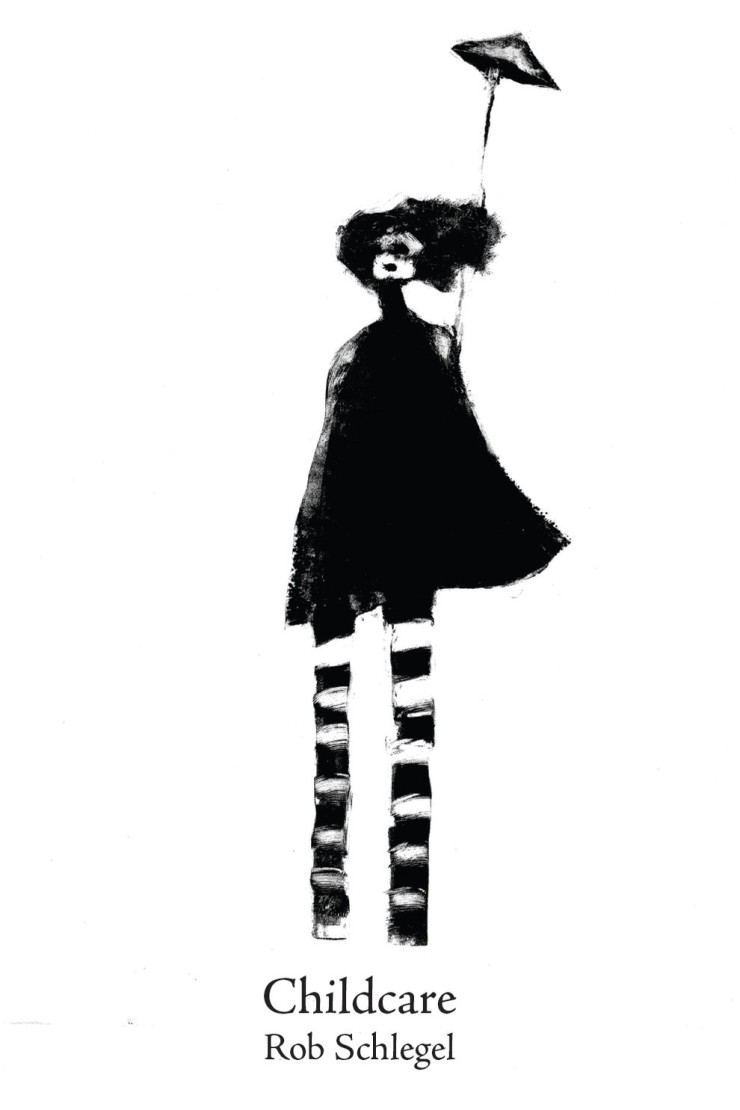Rob Schlegel
Four Way Books ($17.95)
I woke up today intending to review Rob Schlegel’s new collection—his fourth, shortest (by line count), and maybe his best. Then I couldn’t find the book for hours, because one kid’s D&D backpack, a bag of dog food, my own undone dishes, and a scheduled Zoom call got in the way. When I finally found Schlegel’s volume, I realized that my distracted, distressed, and familially challenged mood fit the book I wanted to recommend. Childcare is a book about parenthood, household maintenance, and daily life; about maximum distractibility and post-quarantine forced togetherness; about our manifestly required (but secretly fragile) emotional resilience in an age when capital and mass media tell us to find individual solutions for collective problems. Are we too busy making grilled cheese sandwiches to address the tragedy of the commons? Or vice versa? What will my words do for my kids, if anything?
Such questions have shown up, for decades, in poems by moms (Rachel Zucker and Bernadette Mayer are two shining examples) but they’re pretty new for poems about, and by, dads, whom adults expect to work independently and outside the home, and who don’t normally, if they are cisgender, come with the same umbilical connections to young children. Schlegel knows time spent writing is time not spent preparing that grilled cheese, and Schlegel’s kids know it too: “Daddy, my daughter says, / When are you going to stop?” “Poetry / Is pointless, my son says. If you write that down / I’ll kill you. I fear he fears / The attention I give it.” What poet parent has not felt that fear? Who has not asked, as Schlegel does, “When will I reach the people I love?”
If such lines—however quotable—sound bald, or abstract, or all too accessible, it’s worth mentioning the elegance and the sophistication in this volume too. Schlegel has learned spareness, abstraction, and accessibility from Oppen (who provides an epigraph), Niedecker, and Dickinson. He’s also learned how to bring readers deep into his own fact-studded idiosyncrasies, quick images (a baby is a “little herring”), and the sounds he makes when he’s alone: “The rolling hills of Pomeroy / Bring the locals local joy.” The diary, the flatness, and the divided attention between what the kids need and what the poet desires place Schlegel in a delightful—and young—tradition, among recent books about domesticity by poets such as Chris Martin, Nick Twemlow, Dobby Gibson, perhaps Dana Ward.
To their disarming ongoingness, to the “competing / Sorrows of parenthood,” to fears about being a man and raising men (“my son pinning the future against the wall”), Schlegel adds white space, concision, and the uncomfortable, imperfect elegance of a careful craftsman sharing a rough draft in the knowledge that making it smoother will ruin it. Those spaces are his self-divisions, his irresolvable quarrels with himself: “I’m two people— / One not speaking to the other.” Like the Bon Iver album he namechecks, Schlegel adds an explicit sense of multiple generations, but where Justin Vernon imagines “I am my mother on the wall,” Schlegel frames his own worries in response: “I’m angry at my father for aging.” His clipped lines suggest he feels the rebuke that sensitive adults get when we remember how privileged we remain: privileged just to have enough to eat, let alone to take care of our kids, to find time to read, to be alive: “I tuck my son into bed. / I wish I had better parents, he says.” Schlegel, and I, hold such wishes for our children too, wishes the poems work hard—and sparely—to name. All of our kids deserve better than we can give them, but they get, at best, you and me.
Click below to purchase this book through Bookshop and support your local independent bookstore:
Rain Taxi Online Edition Spring 2024 | © Rain Taxi, Inc. 2024

